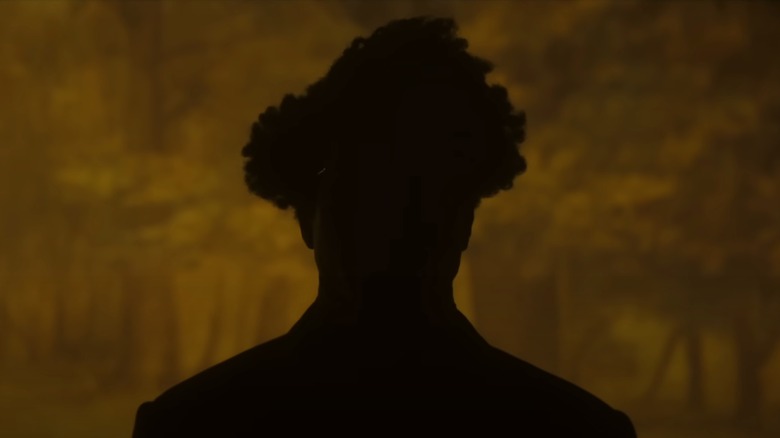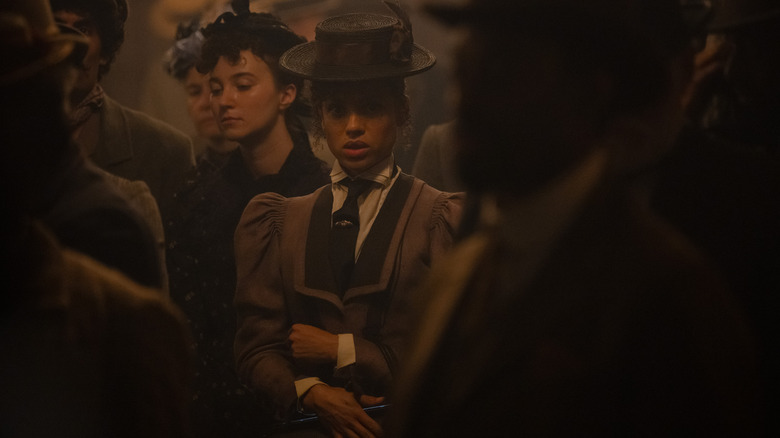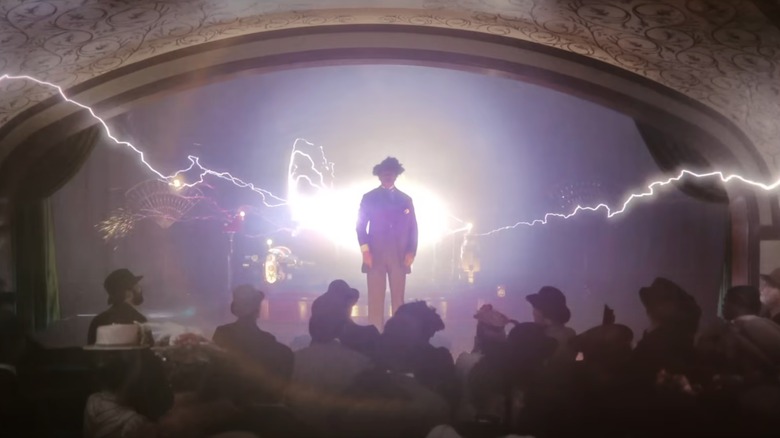Oof, Jonathan Majors Makes Loki Season 2 Episode 3 Pretty Awkward
Warning: This article contains spoilers for the latest episode of "Loki."
To this point in "Loki" season 2, it's felt easier than expected to compartmentalize the series — not just from connections to the greater Marvel Cinematic Universe, but also from the disturbing criminal allegations surrounding actor Jonathan Majors. Until episode 3, any trace of the villainous He Who Remains has been limited to foreboding statues at the Time Variance Authority. The opening shot of the entire season awkwardly opened on a close-up of this very image, in fact, which seemed to confirm previous statements that no reshoots took place following Majors' arrest. Otherwise, any trace of Kang's presence has remained hidden behind the curtain.
That all changed with this latest episode, however. Desperate to put the malfunctioning TVA back in order, Loki (Tom Hiddleston) and Mobius (Owen Wilson) follow the breadcrumbs left by Ravonna Renslayer (Gugu Mbatha-Raw) all the way to the Chicago World's Fair in 1893. In this branched timeline, one of the many hucksters and con-men trying to take advantage of the occasion and make a quick buck turns out to be none other than a variant of Kang, known as Victor Timely. While much of the hour is driven by the typical Loki/Mobius buddy comedy duo and Sylvie's (Sophia Di Martino) frequent interruptions as she's bent on killing any and all Kang variants she can get her hands on, it's Majors and his, uh, distinctive performance as Timely that receives the bulk of the episode's attention.
Unfortunately, giving him ample amounts of screen time and dialogue backfired in a big way. With so much weight placed on Timely's moral worth, several uncomfortable moments arise, given what the actor is currently embroiled in. It all adds up to the best and worst episode of "Loki" so far.
A variant unveiled
You almost have to wonder whether, at any point in the last year, anyone involved in the production of "Loki" looked back at episode 3 and flinched at the vast gulf between the central battle over Victor Timely's soul and the criminal allegations swirling around Jonathan Majors himself. While nobody can reasonably blame Marvel Studios or the writers of "Loki" for the actions Majors is accused of (although there is something to be said for one of the biggest studios in the world conducting thorough background checks, given reports of a well-established pattern of behavior dating back decades), most can agree that the optics of a character performed by Majors either loudly insisting on his own moral standing or taking a self-aggrandizing tone as he accepts the flowery compliments of others made for an unpleasant viewing experience, at times.
Despite the obvious disconnect between facts and fiction, the choice to have Loki defend Victor's life while Sylvie remains intent on destroying him made for tremendous dramatic conflict. By setting Loki, Sylvie, and Renslayer at odds with one another through their competing loyalties and motivations, the writers inject the episode with a sense of life and ambiguous rooting interests that few MCU installments have ever had before. That said, it's a shame that this is undercut by the awkward implications of Ravonna adoringly stating that, "I'm starting to see the man you'll become" or Timely defending himself against Sylvie's accusations of Kang's villainy by saying, "That isn't me. You don't know me. You don't know the heart that I have beating in my chest."
And yet, that's still not even the worst aspect of the episode. Above all else, there's the matter of Majors' actual performance. In all honesty, we're not sure what exactly is going on here.
Over-the-top theatrics
Based on our introduction to Victor Timely, it's clear that this is a man who lives for theatrics. Everything is a performance to him, starting with his ploy to pull the wool over the heads of a curious audience at his demonstration of his Temporal Loom "prototype." When in the company of Loki, Mobius, Renslayer, and Miss Minutes (Tara Strong), he croons endlessly about his inventions and visionary genius and the limitations imposed upon his imagination by a technologically inferior time period. Meanwhile, we know all along that he only had the ability to do any of this because Renslayer put her thumb on the scales of time (so to speak) and delivered a ready-made TVA handbook right into his living room as a child.
But none of that quite explains why Majors' performance feels so unmodulated and imbalanced in this episode. As I alluded to in my review of "Loki" season 2, his stilted line deliveries and constant stuttering seem to be in service of a brilliant scientist with very little understanding of social customs, but this cartoonish take on the character mostly only ever comes across as playing to outdated tropes. In other words, he's doing a lot to put his stamp on this variant, but it never adds up to a complete, well-defined character. Your mileage may vary on just how distracting he is, but inviting comparisons to Jesse Eisenberg's similarly unflattering, offbeat, and wildly contradictory take on Lex Luthor in "Batman v Superman: Dawn of Justice" probably isn't ideal!
We knew beforehand that "Loki" would come saddled with a Majors problem, but there's certainly no way to compartmentalize things anymore.
New episodes of "Loki" stream on Disney+ every Thursday night.


